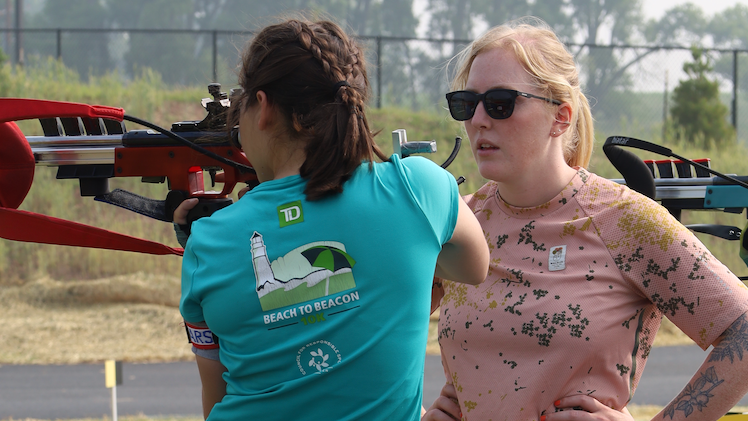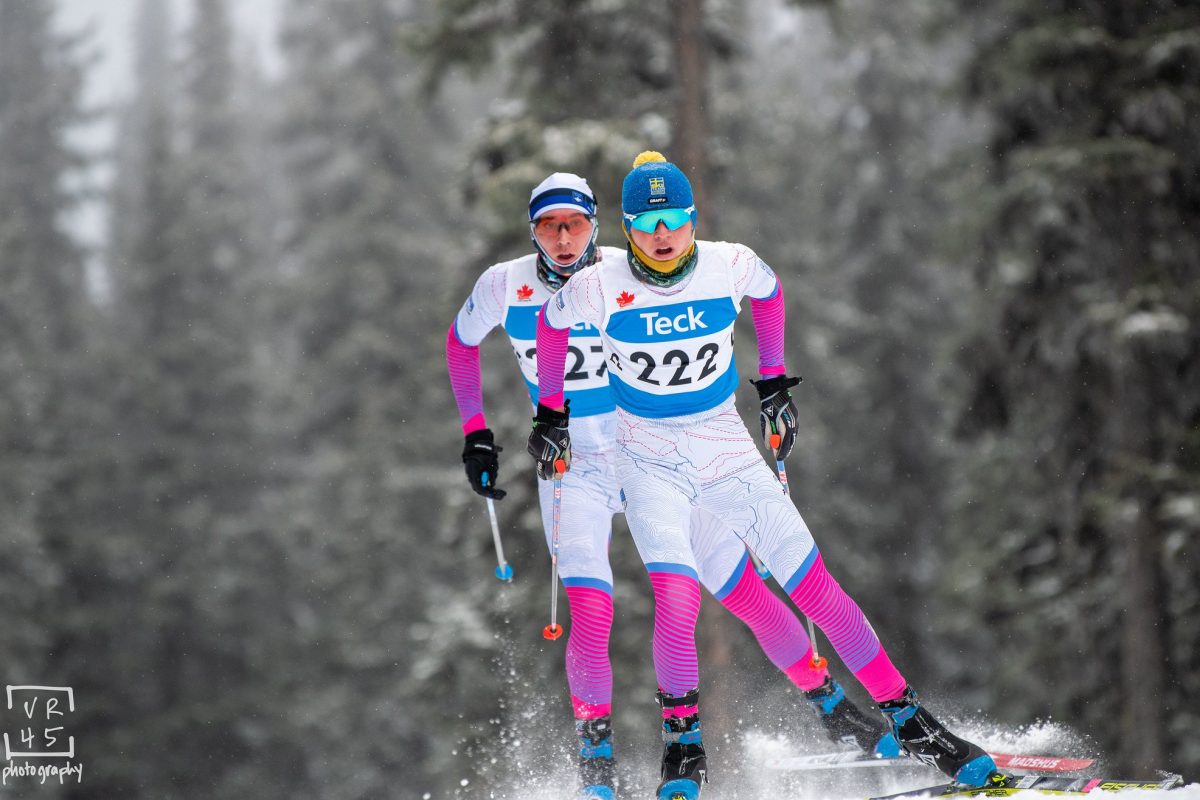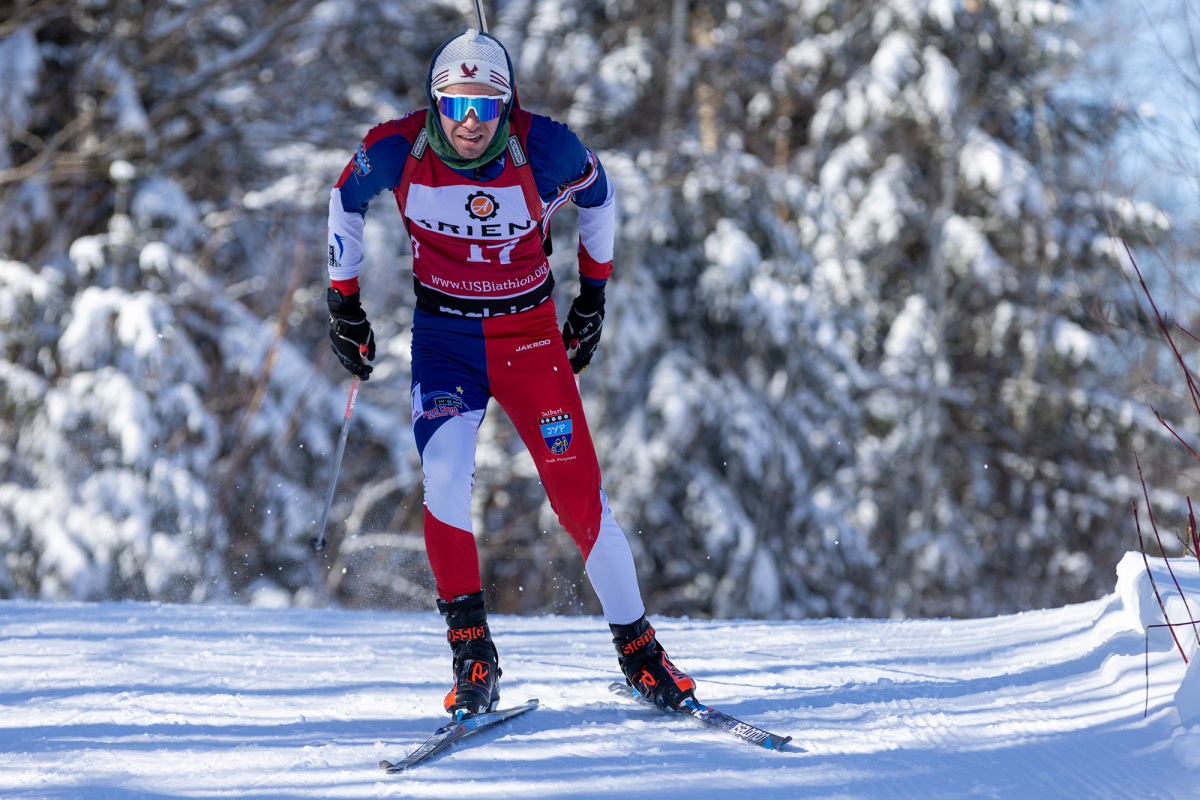
The best biathletes in the world got a warm welcome in Oberhof, Germany, on Wednesday – in fact, they could be forgiven if they felt that they were in the Thuringian version of a tropical storm.
Although it didn’t actually rain during the evening race, the temperatures hovered just around freezing, humidity was close to 100 percent, and the wind, despite averaging around two meters per second, was recorded to gust up to 35 miles per hour at a nearby weather station. Add that to the dearth of snow resulting from the weekend’s downpour, and it just doesn’t look like winter in Oberhof.
But women from 14 countries gamely raced through the woods on a white ribbon of packed snow, and thrilled the crowd in an evening relay under the lights of the stadium.
And that white ribbon was a character in the race, too: the trucked-in snow was deep, rutted in places, and slow nearly everywhere. Fanny Welle-Strand Horn of Norway, Jenny Jonsson of Sweden, and Nadezhda Skardino of Belarus tangled on an early uphill as they tried to awkwardly skate through the wet mush, causing two of them to fall. Even on the very fist lap, the top women threw huge snowplows as they approached downhill corners. On some of the course’s gradual uphills, they appeared to be barely moving as they strained to keep up their V2. The course’s lights glistened in the wet puddles left in the ski tracks.

There were plenty of surprises in the initial legs of the relay. At the first handoff, top seed Norway was stuck in 11th place, nearly two minutes behind the first-place French, after Horn had to visit the penalty loop twice.
On the opposite end of the spectrum, 11th-seeded Slovakia was still in podium position at the second handoff. It was expected that their star, Olympic gold medalist Anastasiya Kuzmina, would turn in a strong leadoff leg, but less so that teammate Jana Gerekova could move the team into second place. Add the fact that Gerekova collided with German skier Tina Bachmann and broke a pole, and her performance becomes even more impressive.
But mistakes in the early going are easy to erase, and standout performances are easy to negate. In the case of Norway, Elise Ringen skied the second-fastest second leg and used only two spare rounds on the gusty range, moving the team from 11th to fifth.
“Elise Ringen… made the race for us,” teammate Synnøve Solemdal said in the postrace press conference.
“I had decided to be aggressive from the gun, and I think I succeeded,” Ringen told Norwegian state television.
As in any relay, the surprises that made the most difference were the ones at the end. And as far as surprises go, the late errors were so great that the 19,000 fans packing the Oberhof stadium were practically speechless.
Germany’s golden girl, eight-time World Champion Magdalena Neuner, had skied away from Russia’s Olga Vilukhina on their second loop and entered the stadium for the race’s final shooting stage with a 15-second lead.
Even if she had to use a spare round, victory seemed certain. The German fans in the stadium were cheering wildly, waving flags and holding up “Magdalena Neuner” banners.

Then, Neuner missed a shot.
“I had a good feeling,” Neuner told German press after the race. “I wondered why the target didn’t drop.”
So she kept shooting, confident in herself. The crowd quieted. She missed another shot. The boos were louder. Then another miss. Neuner later said that she was eventually “resigned” that she couldn’t knock down the targets; she at least took a long pause before her fourth shot. There were gasps as she quickly missed twice more.
For any World Cup athlete to miss all five targets in a stage – to “dirty” – is practically unheard of, but for the very best? The development was more shocking than any of the convoluted plot twists in “Storm of Love,” the star’s favorite soap opera. The crowd was still trying to process what had happened as Neuner loaded the first of her spare rounds, a luxury only available in relays.
Finally, she hit a shot.

But by the time she had missed with her second spare round, Vilukhina had left the shooting mat beside her. Neuner missed again and had to do something she’s probably never done before, at least not at this level: ski four penalty loops.
After an agonizing minute and a half on the range and then another 1:44 on the penalty loop, Germany, which just three minutes earlier had been leading the race, was far behind Russia, Norway, and France, and had no chance of reaching the podium.
At the front , Tora Berger of Norway was attempting to chase down Vilukhina; the two were separated by 13 seconds after shooting. But the German fans were in such shock that they didn’t put their usual zest into spectating – they barely cheered at all as third-place Sophie Boilley of France knocked down her final target.
Vilukhina was almost certainly under more pressure than she ever had been before, and accepted the challenge. Despite an attack by Berger, the Russian didn’t give up even a second over the first half of the loop, which seemed unbelievable when watching Berger’s furious tempo and drive. By the end of the race, Vilukhina was slowing down, so exhausted that her poles dangled limply at her sides as she negotiated a mashed-potatoes downhill. But she had the victory in hand and crossed the finish line six seconds ahead of the Norwegian.
Russia had ended the first period of World Cup racing on a high note, with Olga Zaitseva winning both the sprint and the pursuit and then anchoring the first-place mixed relay in Hochfilzen, Austria. With today’s win, her team has made it four in a row.
“I hope we can be the dominant team in biathlon; we have worked very hard for it,” said leadoff skier Anna Bogaliy-Titovets in a press conference.
As for the French, who crossed the line a 1:06 off the Russians’ pace, they were just relieved to be on the podium after Boilley replaced an ill Marie Laure Brunet.
“Without our leader Marie, we did not expect this, but it is a very nice surprise to start the New Year up here,” said Anais Bescond.
Neither the U.S. nor Canada entered a team.



